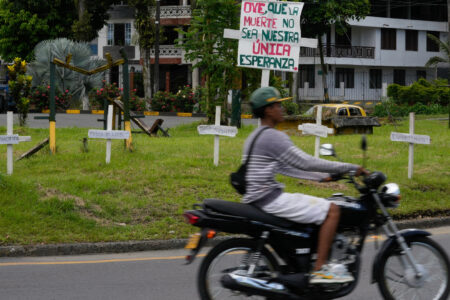
On December 29, 2015, when many Canadians were preparing to welcome the new year, the World Health Organization announced its own cause for celebration: Ebola was gone from Guinea and there had not been a single new case worldwide since November. The WHO declared the outbreak had ended in January, after 42 days of zero cases. New isolated cases of Ebola have popped up since then, but all experts agree the worst is behind us.
West Africa’s Ebola outbreak was the health news story of 2014 and 2015. Identified in March 2014 and declared an emergency in August 2014, the virus spread quickly in a region that had never before experienced it. The result was harrowing. At least 28,646 people contracted the virus and 11,323 people died. Even worse is how the outbreak eviscerated the health systems and economies of Guinea, Liberia and Sierra Leone — three of the world’s poorest countries — whose 22 million people will be affected for decades to come.
This Ebola outbreak was a scary drama for people everywhere. I still remember the fear in Canadians’ voices who called in to a CBC Radio program I was chairing. One man expressed his concern about riding Toronto’s subway. A woman revealed her apprehension of associating with African Canadians. Others predicted doom unless we immediately closed Canada’s borders.
While these fears were never merited, the greatest Ebola fear seems to be at the cusp of realization: that we will not learn from this Ebola experience and that we will not address the underlying global institutional failures that allowed it to occur in the first place. What a tragedy it would be if we need a far worse pandemic than Ebola, one that kills many more people and wreaks even greater havoc, to finally motivate the global institutional changes that are urgently required.Of course, we have learned something from this Ebola outbreak. We have actually learned at least three important lessons.
The first lesson is how properly funded public health interventions can stop the spread of viruses in their tracks, even in this age of hypermobility and transcontinental travel and even after a virus has spread internationally. Hard work remains ahead to maintain heightened disease surveillance and rebuild what was destroyed, but the worst is now behind us thanks to the solidarity of West African citizens and the world’s public health professionals.
The second lesson is the need to invest in research and development for new technologies and strategies that can help make us better prepared for future outbreaks of new and neglected diseases. The greatest Canadian contribution to this particular outbreak response was the Ebola vaccine rVSV-ZEBOV. While this vaccine had tragically remained undeveloped by the company given its exclusive licence after discovery by Canadian government scientists in 2005, at least we now have a vaccine that was proven effective in a clinical trial last year. We are all safer as a result.
The third lesson involves the weakness of our global health agencies and how desperately they must be reformed. Many of us global health researchers have been ringing alarm bells for years — flagging the World Health Organization’s weaknesses, the unenforceability of the International Health Regulations that legally govern countries’ responses to pandemics, insufficient support for boosting national disease outbreak response capacities, and destructive competition among global health agencies. But now the names and failings of these global health agencies have been splashed across the front pages of the world’s leading newspapers and on prime-time television. Reforming the World Health Organization and the International Health Regulations, for example, has attracted political attention at the highest levels, including G7 heads of government and the United Nations Security Council. Ordinary Canadians have discussed these agencies’ failings in public forums, on the radio and at their kitchen tables.
Learning lessons is great, but such learning will help and honour the 11,323 lives lost in this Ebola outbreak only if we actually act upon it. So far that has not happened in any meaningful way. It has been two years since the Ebola outbreak started, yet public health capacity remains as weak as ever, disincentives for funding neglected disease research have not been resolved, and our global health agencies remain as they have long been. Some reforms are currently being debated, but progress is glacial in pace and time is running out. My own research shows that major disease outbreaks like Ebola can create a three-year policy window to make change before attention shifts elsewhere. Two years have passed; we have only one year left to go.
All of this matters greatly to the health, well-being and future prosperity of Canadians, and Canada has an important role to play in making the world a safer place. Those were the key messages that came out of a recent panel discussion on Ebola at the 2015 Pierre Elliott Trudeau Foundation Conference. At this event, the World Bank’s Tim Evans explained how Canada can support international efforts to create an emergency pandemic response fund, Laurie Garrett of the Council on Foreign Relations described how the country can encourage changes to the World Health Organization, and the Canadian Red Cross’s Hossam Elsharkawi identified how we can clear the legal and regulatory barriers that diminished Canadian humanitarian organizations’ ability to quickly respond. I argued that Canada could advocate to add tough sanctions to the International Health Regulations, both because enforcement mechanisms work and so that we can redeem ourselves from our previous embarrassing visa restrictions against West Africans, which violated this legally binding (albeit toothless) treaty.
The reality is that without global institutional innovation we will continue to be ever more threatened by disease outbreaks like Ebola. Our world is getting smaller, with people travelling farther and more often than ever before, carrying potentially dangerous bacteria and viruses wherever we go. Canada is particularly vulnerable as the world’s “globalization nation,” but we are also particularly well placed to effect positive change as historical champions of global health, international cooperation and multilateralism.
So how many people must a pandemic kill before the world actually addresses the underlying global institutional failures that allow them to occur? No one knows. But 2016 will show us whether 11,323 deaths were enough.
Do you have something to say about the article you just read? Be part of the Policy Options discussion, and send in your own submission. Here is a link on how to do it. | Souhaitez-vous réagir à cet article ? Joignez-vous aux débats d’Options politiques et soumettez-nous votre texte en suivant ces directives.






